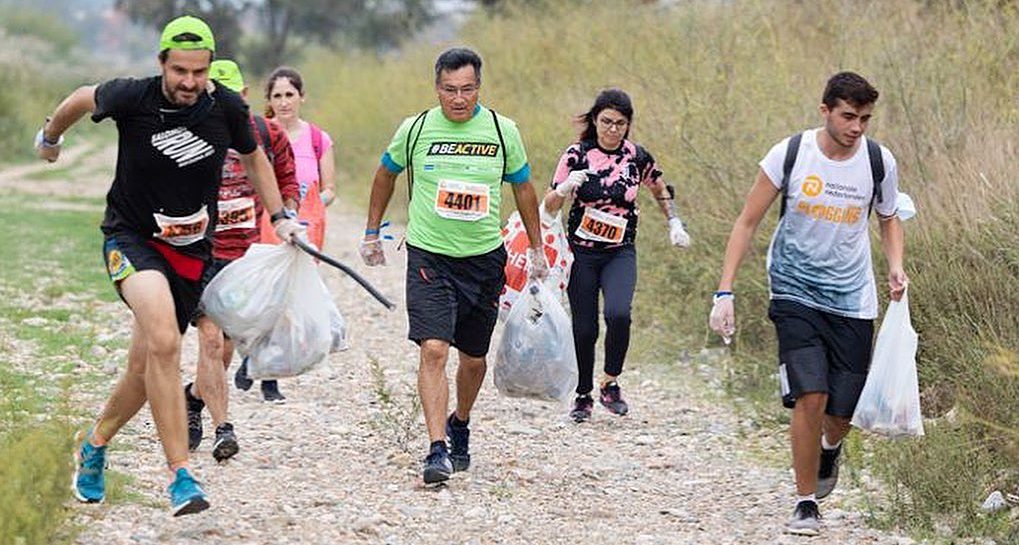Learn more about Plogging: The initiative that has recovered 25 tonnes of rubbish in Spain

The planet should be at the top of the world's political agenda, but in the meantime, it should be at the top of the agenda. there are many independents who have succeeded in establishing initiatives that bring about significant environmental change.
One of these initiatives is plogging, a sport born in Sweden in favour of the planet that arrived in Spain three years ago. and that, according to several media outlets, has recovered more than 25 tonnes of waste and generated an economic impact of 3.8 million euros..
Now, while plogging has several recognisable achievements to its credit, not everyone knows what it is or how it impacts so much on the planet environmentally and economically.
What is plogging?
Plogging combines outdoor exercise with waste collection. In other words, anyone who does outdoor sports can be part of this initiative, which requires that in the midst of these physical actions, litter can be collected in the mountains, on the beaches and in the city.
Plogging has been joined by practitioners of the hiking, running, kayaking, diving, paddle surfing, snorkelling, trail, cycling, skiing and parkour..
The creation of this activity is attributed to Erik Ahlströmwho travelled to Stockholm from a small town in Sweden. He began to incorporate picking up all the rubbish he encountered along the way into his regular sporting activities.
By 2018, plogging, by this compatriot of activist Greta Thunberg, had reached many more countries.
The only requirements for plogging are comfortable sportswear, gloves and bag. Each of these elements may vary according to the sport where the collecting activity is taking place.
Each waste that is found must be classified according to its characteristics. broken bottles, sharp objects, plastic, paper, glass, debris, batteries, and cigarettes.
In order to sort waste, it is recommended that, if you go in a group, you assign a type of material to each group and that each bag contains each type of waste.
When combining plogging with water sports, a bag or hand net should be available to filter the water and facilitate the collection of debris, but should not bring any living creatures with it.
What is plogging for?
As plogging combines sport with collecting, it is not possible to say that it serves only one purpose. Rather, it has positive consequences on the body of the people who practice it and on their own and other people's environment.
According to the website of ploggingrrevolution.com this activity brings with it the following benefits:
1. Work on your intensity without going long distancesPlogging: Athletes who engage in plogging can work on their intensity without having to do long runs, thanks to the constant movements that are made to pick up waste. Squats are done without the need to establish a long routine. Other actions can also be involved to make the exercise complete.
2. Avoid contaminationAs it has been made clear, this activity is in charge of collecting all the rubbish that is in the way of outdoor sportsmen and women. This reduces and avoids pollution of the soil, cities, rivers, seas and oceans.
What are the achievements of plogging in Spain?
The activity initially arrived in Spain in Ibiza and spread to many more cities in the country, such as Malaga, Palma de Mallorca, Seville, Madrid, A Coruña, Barcelona, Bilbao, Valencia, Zaragoza and Teruel.
Months ago, Óscar Caro, director of Plogging Tour, told the EFE news agency that this activity achieved "to raise awareness of the circular economy and act against climate change, we ensure our future and that of the next generations".
To date, plogging has collected more than 25,400 kilos in different areas of Spain.
A Nationale-Nederlanden Plogging Tour, the first event in Europe to combine sport and ecology, has also been successfully realised and is supported by the Consejo Superior de Deportes.
As part of the Nationale-Nederlanden Plogging Tour, waste of all kinds such as plastics, cans, bottles, intimate hygiene items, wipes, textiles, tyres, construction waste and 1,492 cigarette butts have been collected.
Fastpacking is not about going faster. It's about going lighter.
If you come from classic trekking, this is the next step: learning to move with less weight,
more fluid and enjoying every kilometre more.
Join the Outsiders Newsletter and start discovering what lightness feels like.
